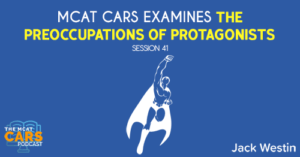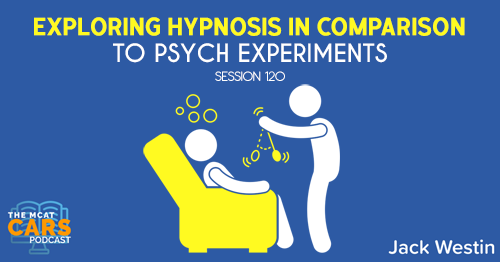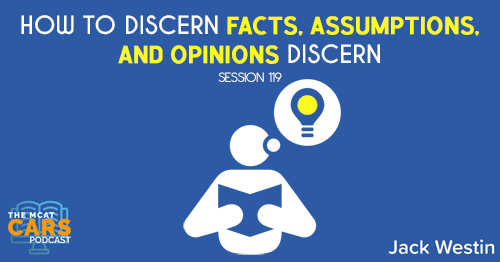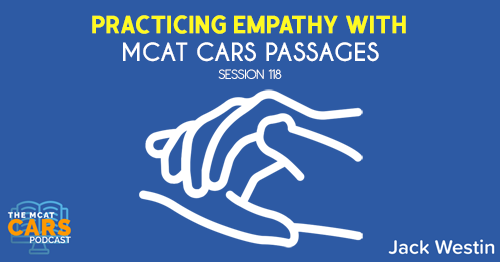Apple Podcasts | Google Podcasts

Session 41
Follow along as we read about how western literature describes its protagonists, from medieval social roles, to inner thoughts and feelings.
Jack Westin joins us as always. If you haven’t yet, check out what Jack Westin has to offer to help you get the MCAT CARS score that you deserve. A quick story. I got a message from someone on Instagram and she got her MCAT score back recently. It went from 124 to 130 in the CARS section. She attributed this to this podcast. If you want to bump up your CARS score, register for their free daily MCAT CARS passages.
When studying for CARS as a group, read the passage together. Answer questions together and figure out what the big ideas are.
Listen to this podcast episode with the player above, or keep reading for the highlights and takeaway points.
Link to article:
http://nautil.us/issue/65/in-plain-sight/why-doesnt-ancient-fiction-talk-about-feelings-rp
Reading medieval literature, it’s hard not to be impressed with how much the characters get done—as when we read about King Harold doing battle in one of the Sagas of the Icelanders, written in about 1230. The first sentence bristles with purposeful action: “King Harold proclaimed a general levy, and gathered a fleet, summoning his forces far and wide through the land.” By the end of the third paragraph, the king has launched his fleet against a rebel army, fought numerous battles involving “much slaughter in either host,” bound up the wounds of his men, dispensed rewards to the loyal, and “was supreme over all Norway.” What the saga doesn’t tell us is how Harold felt about any of this, whether his drive to conquer was fueled by a tyrannical father’s barely concealed contempt, or whether his legacy ultimately surpassed or fell short of his deepest hopes.
Jump ahead about 770 years in time, to the fiction of David Foster Wallace. In his short story “Forever Overhead,” the 13-year-old protagonist takes 12 pages to walk across the deck of a public swimming pool, wait in line at the high diving board, climb the ladder, and prepare to jump. But over these 12 pages, we are taken into the burgeoning, buzzing mind of a boy just erupting into puberty—our attention is riveted to his newly focused attention on female bodies in swimsuits, we register his awareness that others are watching him as he hesitates on the diving board, we follow his undulating thoughts about whether it’s best to do something scary without thinking about it or whether it’s foolishly dangerous not to think about it.
These examples illustrate Western literature’s gradual progression from narratives that relate actions and events to stories that portray minds in all their meandering, many-layered, self-contradictory complexities. I’d often wondered, when reading older texts: Weren’t people back then interested in what characters thought and felt?
Perhaps people living in medieval societies were less preoccupied with the intricacies of other minds, simply because they didn’t have to be. When people’s choices were constrained and their actions could be predicted based on their social roles, there was less reason to be attuned to the mental states of others (or one’s own, for that matter). The emergence of mind-focused literature may reflect the growing relevance of such attunement, as societies increasingly shed the rigid rules and roles that had imposed order on social interactions.
But current psychological research hints at deeper implications. Literature certainly reflects the preoccupations of its time, but there is evidence that it may also reshape the minds of readers in unexpected ways. Stories that vault readers outside of their own lives and into characters’ inner experiences may sharpen readers’ general abilities to imagine the minds of others. If that’s the case, the historical shift in literature from just-the-facts narration to the tracing of mental peregrinations may have had an unintended side effect: helping to train precisely the skills that people needed to function in societies that were becoming more socially complex and ambiguous.
[Related episode: The Expanding Marvel Cinematic Universe]
[04:04] Paragraph 1, Sentence 1
Reading medieval literature, it’s hard not to be impressed with how much the characters get done—as when we read about King Harold doing battle in one of the Sagas of the Icelanders, written in about 1230.
Jack says:
Just keep an open mind and see where the author is going. This is probably an example of how these characters get done.
[05:12] Paragraph 1, Sentence 2
The first sentence bristles with purposeful action: “King Harold proclaimed a general levy, and gathered a fleet, summoning his forces far and wide through the land.”
Jack says:
The author is giving an example of what’s getting done.
[05:39] Paragraph 1, Sentence 3
By the end of the third paragraph, the king has launched his fleet against a rebel army, fought numerous battles involving “much slaughter in either host,” bound up the wounds of his men, dispensed rewards to the loyal, and “was supreme over all Norway.”
Jack says:
More examples here.
[06:05] Paragraph 1, Sentence 4
What the saga doesn’t tell us is how Harold felt about any of this, whether his drive to conquer was fueled by a tyrannical father’s barely concealed contempt, or whether his legacy ultimately surpassed or fell short of his deepest hopes.
Jack says:
Pay attention and keep an open mind so you can connect with the author. Then you get to think about things you might not have thought about. You see these characters but you don’t think about why they do the things they do.
So the author is bringing up different reasons. Maybe some contempt for the father or hopes not being realized. And this makes you think about the feelings these characters have.
Also, know that the author is pointing out that we don’t really talk about the characters’ emotions, feelings, and desires as they’re presenting the characters.
[Related episode: We Use Our MCAT CARS Skills to Read About an Author]
[08:20] Paragraph 2, Sentence 1
Jump ahead about 770 years in time, to the fiction of David Foster Wallace.
Jack says:
These are more examples maybe. Keep track of the date here. It’s a long time later.
[08:45] Paragraph 2, Sentence 2
In his short story “Forever Overhead,” the 13-year-old protagonist takes 12 pages to walk across the deck of a public swimming pool, wait in line at the high diving board, climb the ladder, and prepare to jump.
Jack says:
Here’s an example from one of the fictions written. In the previous paragraph, all this stuff is happening. Now, there are 12 pages. It may be implying that in the future, stuff is done less often.
If you actually pay attention, it will make you believe the author more. The author is saving us time by telling us. So this is what the author is doing here.
[10;54] Paragraph 2, Sentence 3
But over these 12 pages, we are taken into the burgeoning, buzzing mind of a boy just erupting into puberty—our attention is riveted to his newly focused attention on female bodies in swimsuits, we register his awareness that others are watching him as he hesitates on the diving board, we follow his undulating thoughts about whether it’s best to do something scary without thinking about it or whether it’s foolishly dangerous not to think about it.
Jack says:
The author is saying that over these 12 pages, we’re taken more into thoughts and feelings versus action. In the previous paragraphs, it was more about action and not so much about thoughts and feelings.
In modern literature, characters accomplish very little but we’re told a great deal about their thoughts and feelings.
[11:57] Paragraph 3, Sentence 1
These examples illustrate Western literature’s gradual progression from narratives that relate actions and events to stories that portray minds in all their meandering, many-layered, self-contradictory complexities.
Jack says:
The last part confuses a lot of students. But this is an example of how the mind works. We can’t make decisions quickly so we go back and forth. We decide one thing and decide another thing. So this is just a description of our minds, feelings, and thoughts.
Don’t get too tied up on these terms that don’t really matter. But you should realize that the bigger point is there’s a progression from showing a lot of action to mostly talking about our feelings.
[13:07] Paragraph 3, Sentence 2
I’d often wondered, when reading older texts: Weren’t people back then interested in what characters thought and felt?
Jack says:
The author is trying to figure out the minds of the readers. The sentence establishes what the author believes. They don’t really discuss thoughts and feelings in the past.
Some people may actually think the authors discuss thoughts and feelings in the past. This question is rhetorical in nature because it’s trying to establish that we don’t discuss thoughts and feelings in the past.
But this also brings up a new point as to why. Not only should you know this situation, but also, let’s discuss why.
[14:05] Paragraph 4, Sentence 1
Perhaps people living in medieval societies were less preoccupied with the intricacies of other minds, simply because they didn’t have to be.
Jack says:
The author is giving a possible reason why people weren’t interested in what the characters thought and felt.
There’s not too much meat so far. And sometimes, when students they realize, they start to read the passage over and over afraid they didn’t understand it. And if you don’t know what you’re reading, that’s okay.
“The difference between someone who scores a 124 versus someone who scores a 120 is confidence. It's not your reading ability.”Click To Tweet[16:10] Paragraph 4, Sentence 2
When people’s choices were constrained and their actions could be predicted based on their social roles, there was less reason to be attuned to the mental states of others (or one’s own, for that matter).
Jack says:
The author is defining what it means by “didn’t have to be.” They’re saying that choices were more limited or constrained. And actions are predicted on social roles.
The author is painting a picture of what life is like back in these medieval times. You had these roles based on who you were in society. So you didn’t really have to worry about what people were thinking. They just did what they were supposed to be doing.
[16:57] Paragraph 4, Sentence 3
The emergence of mind-focused literature may reflect the growing relevance of such attunement, as societies increasingly shed the rigid rules and roles that had imposed order on social interactions.
Jack says:
This is another transition showing why the change in literature and it’s because societies were getting rid of these rules. And when you get rid of these rules, your feelings can come out. Because when these rules were in place, you were just doing what you’re supposed to do for your role in society. Our roles in society are the rules that you should have for that role.
This is one of the reasons why the author believes there’s a progression towards discussing feelings in literature. It’s the fact that our societal roles have been lifted. They’re dissipating.
[18:10] Paragraph 5, Sentence 1
But current psychological research hints at deeper implications.
Jack says:
This is another transition with the author talking about research that shows a different reason.
[16:25] Paragraph 5, Sentence 2
Literature certainly reflects the preoccupations of its time, but there is evidence that it may also reshape the minds of readers in unexpected ways.
Jack says:
You might not understand what’s being said here, so let’s just keep reading.
[18:57] Paragraph 5, Sentence 3
Stories that vault readers outside of their own lives and into characters’ inner experiences may sharpen readers’ general abilities to imagine the minds of others.
Jack says:
It’s not discussing why anymore. But it’s talking more about the impact. They’re not discussing the constrained roles anymore which was discussed in the previous paragraph.
This paragraph says it’s something that’s happening. But it is also reshaping the readers in terms of how they think about things.
The second sentence of this paragraph is the most important. As society changes, literature is changing.
But this extra information is going in a new direction. It’s saying that it has also reshaped the minds of readers in unexpected ways.
This is actually a tangent. It’s a totally different kind of idea or direction. We’re not discussing why literature progressed which was discussed in the previous paragraph. Now, we’re discussing how this progression impacts society. And this is done by making them aware of other people’s minds.
[22:08] Paragraph 5, Sentence 4
If that’s the case, the historical shift in literature from just-the-facts narration to the tracing of mental peregrinations may have had an unintended side effect: helping to train precisely the skills that people needed to function in societies that were becoming more socially complex and ambiguous.
Jack says:
It not only changed because of the social construct changing. But now, it’s helping the social construct that’s changing. It’s helping society.
This paragraph is going into the direction of how it helped the new society. But it doesn’t say that it’s helping the new society to become more open-minded. It just says it’s helping the current society in some way.
[23:50] The Big Takeaway
Medieval literature focuses less on the mind because it comes from this more constrained social environment. But now, we’re becoming more focused on people, their perspectives and their feelings.
[25:36] Jack Westin
Go to Jack Westin and sign up for his free daily CARS passages. If you’re looking for even more in-depth, check out one of his courses.
Links:
Link to article:
http://nautil.us/issue/65/in-plain-sight/why-doesnt-ancient-fiction-talk-about-feelings-rp
SEARCH SITE
SEARCH SITE
LISTEN FOR FREE











